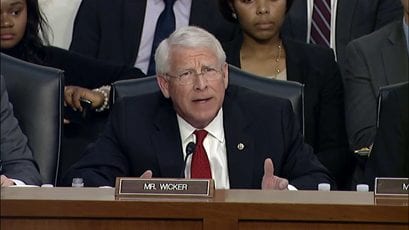
Studio portrait of Sid Salter. (photo by Beth Wynn / © Mississippi State University)
By: Sid Salter
Conservative newspaper columnist George Will is a magnificent political observer and a marvelous writer. Whether it’s politics or baseball, Will’s stuff is a reliably good read.
A Will column earlier this month on Democrat Mike Espy’s current run for the U.S. Senate in Mississippi was mostly spot on. Espy is a tested, honorable public servant who would be capable of representing Mississippi in the U.S. Senate if elected.
As Will suggests, Espy is battle tested and his family has a solid track record in Mississippi Delta politics. Will’s column suggests that Espy could “finagle” a win in his Nov. 6 showdown with Republican U.S. Sen. Cindy Hyde-Smith of Brookhaven, Tea Party favorite state Sen. Chris McDaniel of Ellisville, and Gulf Coast municipal official Tobey Bartee.
Will’s argument is as follows: “Here is the arithmetic Espy is using to try to pry open the wallets of national Democratic donors:
“Assume that he wins 95 percent of the African American turnout. If that turnout is 33 percent of the total state turnout, as it was in 2016 when Hillary Clinton expended no resources on Mississippi, he needs 28 percent of the remaining vote.
“If African American turnout is 35 percent — the African American portion of the state’s registered electorate — he would need 26 percent of the other votes. If African American turnout mirrors the African American portion of the state’s population (37 percent), he needs to receive 24 percent of the remaining vote.
“If the African American turnout is 39 percent of the total, a surge in turnout similar to what occurred in the Alabama special Senate election won by Democrat Doug Jones, Espy will need just 22 percent of the remaining vote,” Will’s winning scenario for Espy holds.
Yet it’s in the voter turnout mathematics that Will loses me in that scenario.
Espy indeed has a slight window of opportunity in the race and that window only opens if there is a historic voter turnout among African American and white Democratic voters on Nov. 6. Such a turnout would have to engage the potent political machine of current 2ndDistrict U.S. Rep. Bennie Thompson of Bolton, who succeeded Espy in Congress.
Thompson and the Espy family have a spirited political history. Thompson, one should note, has gotten the better of those exchanges. But assume, if you will, that everything is rainbows and unicorns between the Espy and Thompson camp in the Mississippi Class II open primary Senate race.
Even in that scenario, how good does voter turnout among Democrats have to be for Espy to make a prophet of George Will?
In 2008, during Barack Obama’s first race for president against Republican John McCain, Mississippi produced the highest voter turnout numbers in the state’s history. Records chronicle that 1.289 million Mississippians voted in the 2008 November general election out of 1.895 million registered voters or 68 percent. Four years later, in 2012, 1.285 million Mississippians votedin Obama’s presidential re-election bid against Republican Mitt Romney.
Obama got 43 percent of the Mississippi vote in 2008 and 43.8 percent in 2012 – but still lost Mississippi by just under 150,000 votes. The suggestion that Mike Espy is going to generate a predominantly African-American Democratic voter turnout among Mississippians that rivals or bests Barack Obama in 2008 or 2012 is, at best, quite a stretch.
What is likely is a runoff election after Nov. 6 in which Espy is among the top two candidates. At that point, the contest becomes yet another exercise in Democrats trying to break the dominant hold that the GOP has held for a quarter-century in federal politics in Mississippi.
With President Trump, the National Rifle Association, National Right to Life, the Farm Bureau, and virtually every business, professional, and agricultural organization in the state openly backing Hyde-Smith over McDaniel among GOP voters, it’s hard to see her campaign stall in the stretch run.











